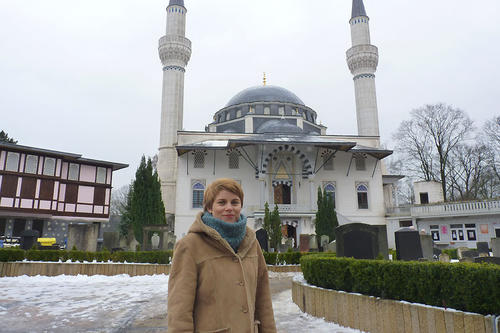Prayer Leaders, Social Workers, Bridge Builders
Islamic studies scholar Anne Schönfeld analyzes the public debate regarding educating imams at German universities
May 29, 2013
Talks with future imams: As part of her dissertation project Anne Schönfeld, shown here in front of the Şehitlik Mosque in Berlin-Neukölln, conducts interviews with students enrolled in the newly established study program in Islamic theology.
Image Credit: Bianca Schröder
When Anne Schönfeld decided to study Islamic Studies, in 2001, she met with mixed responses. Some people were interested and curious, but she also heard “a rant or two” about archaic mindsets, violent propensities, and patriarchal structures. The fact that she ultimately decided to concentrate in her studies on public debates surrounding Islam was at least partly a reaction to this resistance, which she encountered frequently when talking with others. Schönfeld, 31, is currently writing her dissertation at the Berlin Graduate School Muslim Cultures and Societies at Freie Universität on the debates that have accompanied the introduction of Islamic Theology as a subject at universities in Germany since the 2010/11 winter semester.
One of the goals that the initiators on the political side associated with the new study program was to provide a formalized education for imams. By integrating this type of program into the canon of subjects offered at German higher education institutions, the hope is that the Islamic prayer leaders will exert a moderating influence, helping to fight extremism and alleviate integration problems.
These kinds of political expectations and objectives are exactly what interests Schönfeld. The key question for her work is therefore how these factors are handled in academia. She has titled her dissertation Islamspezifische Wissensproduktion zwischen Wissenschaft, Politik und Öffentlichkeit: Die Institutionalisierung der Imamausbildung in Deutschland [Islam-specific Production of Knowledge between Academia, the Political Sector, and the Public: The Institutionalization of Education of Imams in Germany].
To practice as an imam, all that is traditionally important is mastery of the rite of prayer. Only some of the imams practicing in Germany have completed a university program in theology, in most cases in Turkey. The response by Muslim organizations to efforts to develop Islamic theology as a field of study at German universities was rather muted at first. “They were worried that fundamental principles of faith would be questioned. When the Koran is interpreted from a historical or critical standpoint, that does, of course, entail questioning of long-standing religious knowledge and traditional practices,” Schönfeld explains. At the same time, she says, the organizations also recognized that the new academic discipline offers them a long-sought opportunity for social acceptance.
For the imams, meeting the many requirements of academia, the political sector, and their own communities is a challenge. They are called on to take a critical view of religious sources, act to prevent extremism in their communities, and build and foster ties with the non-Muslim majority society. “The question is whether the role of the imam is not actually being overloaded if the imam is not only supposed to handle the more narrowly defined religious tasks, but also to act as a social worker and represent the mosque to outside audiences,” Schönfeld says. Some scholars also doubt that the universities are even able to teach the practical skills required of an imam in areas such as reciting the Koran. As a result, some institutions have already distanced themselves from plans for academic training of imams, and are concentrating instead on fundamental theological research.
The dynamic triggered by state-sponsored efforts to formalize the education of imams is the point of departure for Schönfeld’s dissertation. From there, she turns her consideration on the relationship between the politics surrounding Islam and the production of knowledge in Germany. She is also interested in the issue of what role university-based theology has historically played in state regulation of religions, and how the current debate surrounding Islamic theology “made in Germany” affects that role. To explore these issues, Schönfeld interviews political figures, scholars, and students, while also analyzing the curricula used for the study programs, publications from government agencies and higher education institutions, forum posts, and media texts on the topic.
The internal discussion within the wider Muslim community regarding the content and self-perceived identity of the new discipline has only just begun, Schönfeld says. There are widely divergent opinions. “There are many Islamic currents and organizations in Germany. It is accordingly difficult to establish consensus regarding acceptance of certain kinds of teaching content.” As a result, she points out, any comment on whether many of the imams practicing in Germany will have a degree in Islamic Theology in the future is mere speculation. Schönfeld adds that the students with whom she has spoken are very happy with available courses and programs, though.
Schönfeld is still some distance from reaching a final summary of her research; she does not plan to submit her dissertation until next year. Stating and defending her views in discussions is no longer difficult, though, unlike at the start of her studies. Just recently, she spoke before the Bundestag on the experience that has been gained with the new study program so far, calling on members to take a critical view of the role of the state in “attempts to regulate religion.”

